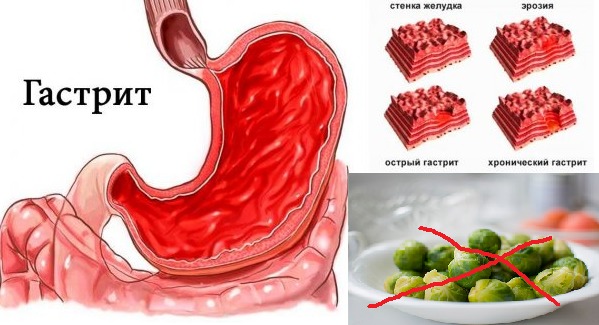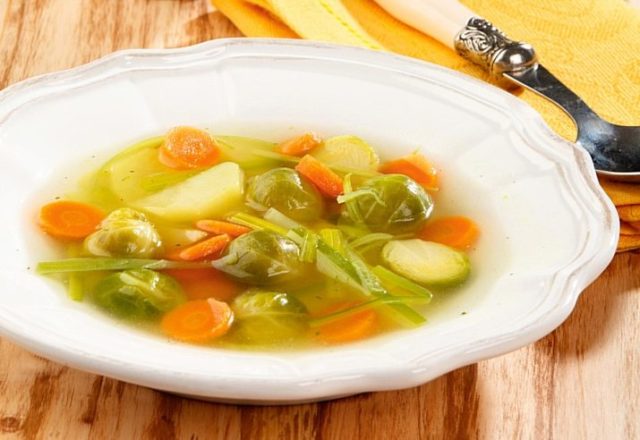Content
- 1 Chemical composition of Brussels sprouts
- 2 Why Brussels sprouts are good for you
- 3 Harm of Brussels sprouts
- 4 Contraindications to the use of Brussels sprouts
- 5 Rules for the use of Brussels sprouts
- 6 The use of Brussels sprouts in traditional medicine
- 7 Brussels sprouts for pregnant women
- 8 Can a nursing mother eat Brussels sprouts?
- 9 Conclusion
The health benefits of Brussels sprouts are undeniable. The multicomponent chemical composition makes cabbage an irreplaceable food product and also a medicine. Regular use improves a person's condition, causes a surge of energy. It is included in diets for weight loss and health maintenance. But the vegetable has more than just positive qualities that you need to know about before you include it in your diet.
Chemical composition of Brussels sprouts
Outwardly, the vegetable resembles a large stump on which leaves grow, and many small forks develop in their axils, the diameter of which is about 5 cm. These fruits are the value of the cabbage variety.
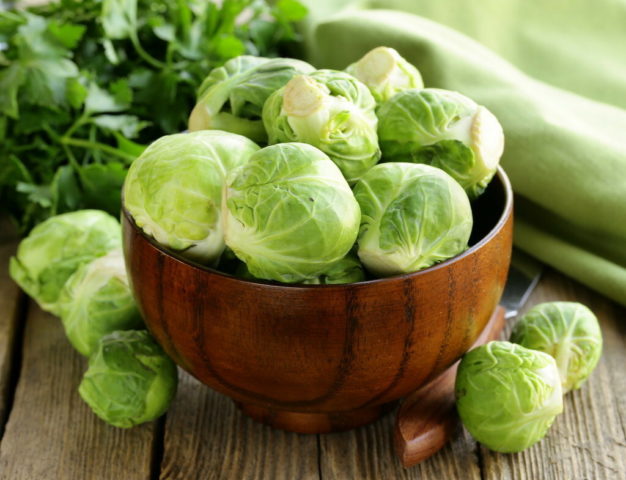
These miniature vegetables look like cabbage.
The nutritional value
The content of chemical elements of cabbage, useful for the human body, is many times higher than their amount in ordinary white cabbage or kohlrabi. The value of the product is 43 kcal per 100 g:
- proteins - 3.8 g;
- fats - 0.3 g;
- carbohydrates - 3.1 g;
- fiber - 3.6 g;
- water - 85 g;
- dietary fiber - 4.2 g
Brussels sprouts ranks first in the amount of proteins, among other brethren ”, so it can be actively consumed by athletes and people suffering from obesity. The presence of fiber improves the functioning of the gastrointestinal tract.
Biochemical composition
Equally important for study is the content of vitamins, micro- and macroelements in Brussels sprouts. The number of chemical components is presented in the table:
Element | Quantity, mg | Percentage of Daily Value |
Vitamins | ||
Ascorbic acid (C) | 85 | 94 |
Retinol (A) | 38 | 4 |
Alpha tocopherol (E) | 0,9 | 6 |
Nicotinic acid (PP) | 1,5 | 7,5 |
Thiamine (B1) | 0,1 | 6,7 |
Riboflavin (B2) | 0,2 | 11,1 |
Choline (B4) | 19,1 | 3,8 |
Pantothenic acid (B5) | 0,4 | 8 |
Pyridoxine (B6) | 0,28 | 14 |
Folic acid (B9) | 31 | 7,8 |
Biotin (H) | 0,4 | 0,8 |
Phylloquinone (C) | 177 | 147 |
Beta Carotene | 0,3 | 6 |
Macronutrients | ||
Potassium | 375 | 15 |
Calcium | 34 | 3,4 |
Silicon | 28 | 93 |
Magnesium | 40 | 10 |
Sodium | 7 | 0,5 |
Sulfur | 34 | 3,4 |
Phosphorus | 78 | 10 |
Trace elements | ||
Iron | 1,3 | 7,2 |
Iodine | 0,08 | 0,1 |
Manganese | 0,3 | 17 |
Copper | 0,7 | 7 |
Selenium | 1,6 | 3 |
Chromium | 0,3 | 0,6 |
Zinc | 0,42 | 3,5 |
Each of them is important in itself, as it performs certain functions in the body. From the table it is noticeable that most of all the vegetable culture contains vitamins K and C. The first is responsible for blood clotting and bone strength, the other strengthens the immune system, promotes the absorption of iron and accelerates the process of tissue repair.
Why Brussels sprouts are good for you
You can feel the benefits of a vegetable with regular use. Useful substances accumulate, and then have a beneficial effect on the body. The impact that Brussels sprouts have on humans:
- The presence of amino acids and glucose normalizes heart function. Reduces cholesterol and plaque formation, minimizes the risk of atherosclerosis, since the components of cabbage protect and strengthen the walls of blood vessels.
- Lutein and vitamin A have a beneficial effect on vision. They prevent the development of the process of degeneration of the retina.
- Vitamin K is not only responsible for blood circulation and hematopoiesis, but also provides nerves with protection, thereby activating brain activity.
- Ascorbic acid is a natural antioxidant. Without it, people do not adapt well during the off-season.
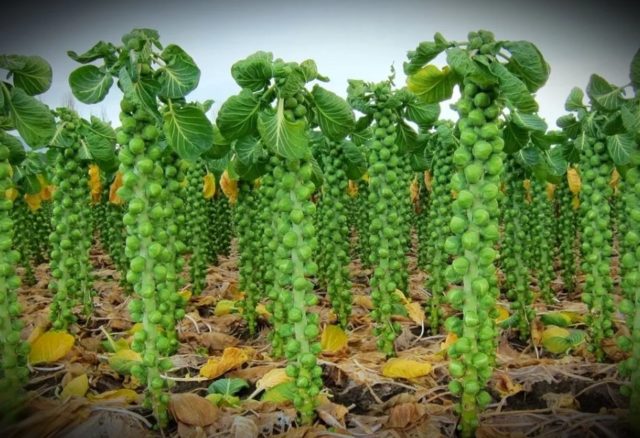
Frequent flu and colds will recede when the vegetable is included in the diet.
Brussels sprouts strengthens and heals a person, in addition, it helps to cope with female and male diseases.
Benefits of Brussels sprouts for women
The richness of ascorbic acid and protein plays an invaluable role for the female body. These components help:
- in the regulation of reproductive function;
- equalize the hormonal background;
- accelerate metabolism.
It is known that Brussels sprouts reduce the risk of developing breast cancer. With daily inclusion in the diet, the likelihood of contracting cancer is reduced by 30%. This occurs under the influence of kaempferol, a substance that reduces inflammation in the female body and strengthens the heart. In addition, the unique substance lowers blood pressure.
Fiber is important for women, which is responsible for the regularity of daily emptying, which is especially necessary for older people. It supports the normal functioning of the digestive tract, and also helps to lower blood sugar levels, preventing the onset of diabetes.
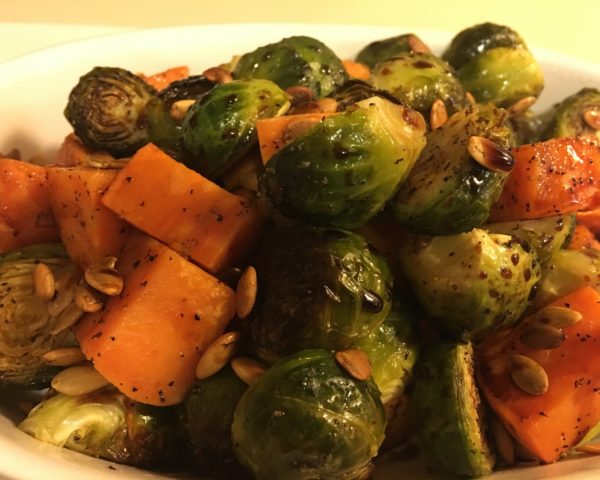
When you add other vegetables, the benefits of Brussels sprouts only increase.
Benefits of Brussels sprouts for men
Despite the low calorie content, the vegetable crop helps to replenish the expended energy of men. It's all the fault of the protein that is part of the vegetable. An interesting fact is that it is Brussels sprouts that are included in the diet of athletes involved in heavy sports. Therefore, it is recommended to use cabbage puree after training.
For men whose work is related to chemical reagents, heavy metals, the product is also indicated, as it removes toxins and harmful substances from the body. Cabbage dishes can reduce mental stress and normalize the nervous, emotional background. Therefore, Brussels cabbages are useful for office workers.
Cabbage normalizes testosterone production, has a beneficial effect on the reproductive system, increases libido, and reduces the risk of impotence. Required Brussels sprouts in the presence of diabetes mellitus, stomach and intestinal ulcers.
Harm of Brussels sprouts
Undoubtedly, there are more useful properties in a vegetable than side effects, but still it is worth using the product carefully so as not to harm yourself. In what situations is the harm from cabbage obvious:
- The combined use of anticoagulants and cabbage causes thrombotic complications. Vitamin K enhances blood clotting, thereby reducing the effectiveness of medications.
- If the body reacts distinctly to any product of the Cruciferous family, causing allergic reactions, then you should not use cabbage.
- The Brussels vegetable increases the production of gastric juice, which negatively affects its work.
- Eating a lot of the product will cause gas and diarrhea.
- It is necessary to exclude the product from the diet with cholecystitis, since vitamin C can aggravate the situation.
In any case, after a single consumption of cabbage, it is necessary to observe the body's response. If unpleasant sensations appear, it is better to give up the vegetable right away.
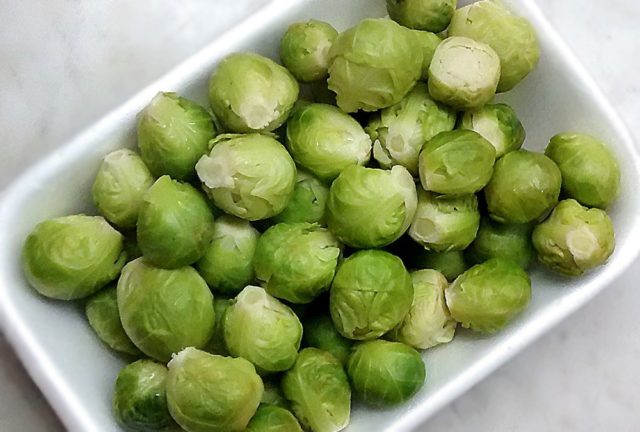
In blanched fruits, more useful components are retained than in boiled ones
Contraindications to the use of Brussels sprouts
The presence of certain diseases provides for a ban on the consumption of vegetables:
- chronic diseases of the stomach and intestines in a state of exacerbation;
- increased acidity;
- aggravated cholecystitis;
- gout;
- endocrine system problems;
- product allergy;
- individual intolerance to one or more chemical components of the Brussels vegetable.
Lovers of this variety should consult with a nutritionist before consuming it to find out the benefits and harms.
Rules for the use of Brussels sprouts
The taste of Brussels sprouts is significantly different from the usual white cabbage, so it is not often consumed fresh. There are many recipes for cooking a vegetable, where it is fried, steamed, boiled. Many housewives prefer to stew or bake it. The rules that guide the preparation:
- The fruits go well with any vegetables, seasonings, spices, the main thing is not to overdo it with them, so as not to reduce the benefits and spoil the taste of cabbage.
- When boiled for a long time, the heads of cabbage become soft, juicy and tasty, but less healthy. To preserve the maximum nutrients, heat treatment should be carried out no more than 30 minutes.
- After thawing, the fruits become flabby. To avoid this, the Brussels forks are blanched in hot water before freezing.
When added to salads fresh, the product emits a slight bitterness, so before cooking it is better to put it in boiling water for a couple of minutes. In this form, Brussels sprouts will benefit all family members.
Nutritionists have deduced the optimal level of daily consumption - 300 g, over which a vegetable can cause side effects.
The use of Brussels sprouts in traditional medicine
The richness of chemical elements determines the use of the vegetable for certain diseases. Decoctions and infusions are prepared from Brussels sprouts:
- With diabetes mellitus. The glycemic index is 30 units - this is a rather low indicator, so cabbage is allowed to be eaten by diabetics of any type. It must be remembered that the product must be heat treated; fresh, it is contraindicated.
- Fruits are able to prevent the appearance of pancreatitis, as well as alleviate the condition in the stage of remission. Consume them in a puree state, after boiling them. On the first day, eat two spoons. If there are no side effects, then the amount is increased to 100 g. It must be remembered that spices and seasonings cannot be used. With an exacerbated course of the disease, cabbage is not included in the diet.
- When losing weight. When developing diets, nutritionists try to include cabbage in the diet at all times, if the patient has no contraindications.
- In the presence of pulmonary diseases (asthma, bronchitis, etc.), the juice obtained from Brussels sprouts helps. You can enhance its effect with additional components. For example, mix 100 ml of cabbage, 50 ml of carrot and 40 g of radish and celery juice, drink 1 glass a day (30 minutes before meals). Reception can last until complete recovery, and in asthma, until the exacerbation is relieved.
- To increase the recovery functions after operations, they drink broth made from Brussels sprouts and chicken.
- In the presence of cardiovascular diseases, use cabbage infusion. Grind 150-200 g of fruits, pour 0.5 liters of boiling water and incubate for 20 minutes. The liquid is cooled and filtered, used together with diuretics daily, but not more than 1 time per day.
When starting the course of treatment, it is necessary to consult a doctor. Self-medication is dangerous, even if the product does not cause allergies. It is highly likely to provoke the development of other diseases.
Brussels sprouts for pregnant women
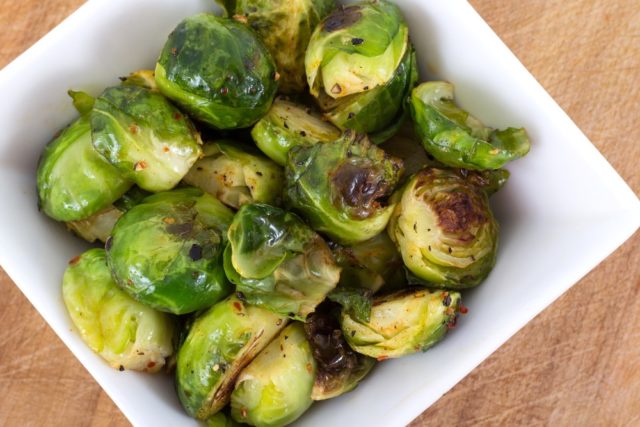
During pregnancy and when feeding a baby, cabbage is best consumed in a thermally processed form.
The Brussels variety has a positive effect on the body of all people, pregnant women are no exception. For women preparing to become mothers, cabbage must be included in the diet. Its benefits are as follows:
- Ascorbic acid significantly lowers blood pressure, normalizes stool, and prevents constipation and weight gain.
- Magnesium normalizes the water balance, which is disturbed when carrying a child. Thanks to the mineral, a woman is protected from edema.
- The main element that a pregnant woman needs throughout the entire period of gestation is folic acid. It is she who is responsible for the normal intrauterine development of the embryo.
Each micro- and macroelement has its invaluable effect on the body of mommy and future crumbs. They start eating Brussels sprouts from early gestation.
Can a nursing mother eat Brussels sprouts?
Breastfeeding Brussels sprouts are a little different. Despite the fact that the cabbage chemical composition will help a woman quickly recover from childbirth, it should be used with caution and only starting from the age of two months of the baby.
It is required to strictly observe the dosage. When a mother overeats cabbage, the baby has colic and bloating.
Lactating women can eat Brussels sprouts only after boiling, stewing or baking. In its raw form, the product takes longer to digest and there is a possibility of poisoning by pathogenic bacteria living on cabbage. When fried, doctors also advise against consuming the vegetable. Fats are unfavorable for the infant's immature gastrointestinal tract.
Conclusion
The benefits of Brussels sprouts are proven by many facts. Its rich chemical composition has a beneficial effect on the body of men, women and children. Many pediatricians advise the vegetable to be one of the first to include in the diet of infants. Any product can harm, therefore, observing the rules of preparation, dosages, you can protect yourself and your household from unwanted health problems.
